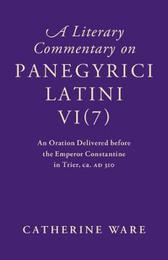
|
A Literary Commentary on Panegyrici Latini VI(7): An Oration Delivered before the Emperor Constantine in Trier, ca. AD 310
Hardback
Main Details
| Title |
A Literary Commentary on Panegyrici Latini VI(7): An Oration Delivered before the Emperor Constantine in Trier, ca. AD 310
|
| Authors and Contributors |
Edited and translated by Catherine Ware
|
| Physical Properties |
| Format:Hardback | | Pages:406 | | Dimensions(mm): Height 224,Width 148 |
|
| Category/Genre | Literary studies - classical, early and medieval |
|---|
| ISBN/Barcode |
9781107123694
|
| Classifications | Dewey:875.01 |
|---|
| Audience | | Professional & Vocational | |
|---|
|
Publishing Details |
| Publisher |
Cambridge University Press
|
| Imprint |
Cambridge University Press
|
| Publication Date |
17 December 2020 |
| Publication Country |
United Kingdom
|
Description
The oration presented in this volume is critical to our knowledge of Constantine's early career and covers Maximian's rebellion, Constantine's claim of descent from Claudius II and his vision of Apollo. Written in AD 310, two years before Constantine's capture of Rome and his acceptance of Christianity, the speech gives a unique insight into the evolution of an imperial persona. This commentary examines the literary context of the panegyric and the role of the classical literary and rhetorical tradition in the recreation of Constantine's image. From the outset, the orator praises Constantine as separate from the imperial college: a deus praesens, god manifest, to the people of Gaul. He uses Lucan and Caesar to link Maximian's bid for power with the civil war between Caesar and Pompey while Vergilian allusion associates Constantine with Augustus.
Author Biography
Catherine Ware is a Lecturer in Classics at University College Cork. She is the author of Claudian and the Roman Epic Tradition (Cambridge, 2012). This book is part of the Panegyrici Latini Project and is the outcome of an Irish Research Council Fellowship/Marie Curie Action fund.
Reviews'For those interested in introducing students to the considerable joys of Late Roman Latin, or in understanding for themselves the considerable richness and texture of the 'vapid and turgid' panegyrics of the fourth century, this work can only be recommended.' Adrastos Omissi, Plekos '... a splendid contribution ... The work is a milestone in the literary study of late Latin prose.' Geoffrey Harrison, Bryn Mawr Classical Review
|